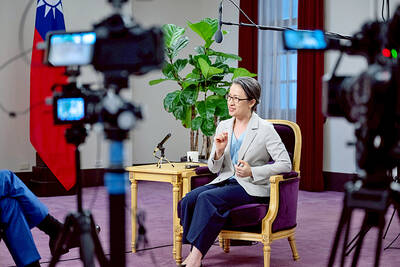As commodity prices rise, sales of “luxury items” such as flowers are falling, the Chinese-language Liberty Times (the Taipei Times’ sister paper) recently reported.
Though Taiwan was once known as the “flower kingdom,” flower prices have dropped to a 10-year low, with half of the flowers that make it to market each day going unsold and being destroyed, the paper said.
“Taiwanese spend an average of a little over NT$100 on flowers each year compared with people in Japan, Europe and the US, who spend between NT$700 and NT$1,200 per capita annually. Taiwan has a lot of room for expansion in its domestic flower market,” Council of Agriculture (COA) Minister Chen Wu-hsiung (陳武雄) said at a flower promotion event on Saturday in the plaza of Taipei City Hall.
At the event, Chen reiterated the government’s determination to increase its support for the flower industry, with the specific aim of promoting domestic flower sales.
The council will also help flower farmers to market their products abroad, he said.
“The flower industry is the most beautiful industry in the country; flowers are good for home decoration, and can boost work efficiency in the office,” Chen said.
As such, he called on the public to demonstrate their appreciation for flowers at the dining table and in the garden, and bring flowers into their daily lives.
The Liberty Times reported yesterday that half of the flowers at the Taipei Pot Plant Auction — approximately 600,000 flowers — are destroyed each day because they are not bought.
The price for bunches of flowers dropped from a yearly average of NT$49.4 to NT$43 for this year, a 14.8 percent drop, the paper said.
The chrysanthemum, in particular, fell to a historic low of NT$15 per dozen, it said.
In response to the price drops, the Agriculture and Food Agency Secretary-General Hsu Hang-ching (�?�) said that the nadir already passed last month, and that the flower industry is regaining strength.

China might accelerate its strategic actions toward Taiwan, the South China Sea and across the first island chain, after the US officially entered a military conflict with Iran, as Beijing would perceive Washington as incapable of fighting a two-front war, a military expert said yesterday. The US’ ongoing conflict with Iran is not merely an act of retaliation or a “delaying tactic,” but a strategic military campaign aimed at dismantling Tehran’s nuclear capabilities and reshaping the regional order in the Middle East, said National Defense University distinguished adjunct lecturer Holmes Liao (廖宏祥), former McDonnell Douglas Aerospace representative in Taiwan. If

TO BE APPEALED: The environment ministry said coal reduction goals had to be reached within two months, which was against the principle of legitimate expectation The Taipei High Administrative Court on Thursday ruled in favor of the Taichung Environmental Protection Bureau in its administrative litigation against the Ministry of Environment for the rescission of a NT$18 million fine (US$609,570) imposed by the bureau on the Taichung Power Plant in 2019 for alleged excess coal power generation. The bureau in November 2019 revised what it said was a “slip of the pen” in the text of the operating permit granted to the plant — which is run by Taiwan Power Co (Taipower) — in October 2017. The permit originally read: “reduce coal use by 40 percent from Jan.

‘SPEY’ REACTION: Beijing said its Eastern Theater Command ‘organized troops to monitor and guard the entire process’ of a Taiwan Strait transit China sent 74 warplanes toward Taiwan between late Thursday and early yesterday, 61 of which crossed the median line in the Taiwan Strait. It was not clear why so many planes were scrambled, said the Ministry of National Defense, which tabulated the flights. The aircraft were sent in two separate tranches, the ministry said. The Ministry of Foreign Affairs on Thursday “confirmed and welcomed” a transit by the British Royal Navy’s HMS Spey, a River-class offshore patrol vessel, through the Taiwan Strait a day earlier. The ship’s transit “once again [reaffirmed the Strait’s] status as international waters,” the foreign ministry said. “Such transits by

Taiwan is doing everything it can to prevent a military conflict with China, including building up asymmetric defense capabilities and fortifying public resilience, Vice President Hsiao Bi-khim (蕭美琴) said in a recent interview. “Everything we are doing is to prevent a conflict from happening, whether it is 2027 or before that or beyond that,” Hsiao told American podcaster Shawn Ryan of the Shawn Ryan Show. She was referring to a timeline cited by several US military and intelligence officials, who said Chinese President Xi Jinping (習近平) had instructed the Chinese People’s Liberation Army to be ready to take military action against Taiwan